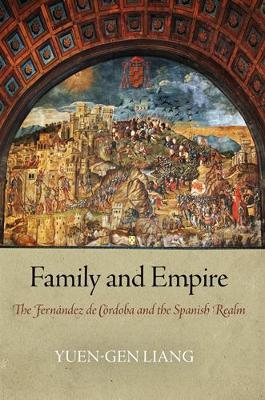
Family and Empire
The Fernández de Córdoba and the Spanish Realm
Seiten
2011
University of Pennsylvania Press (Verlag)
978-0-8122-4340-6 (ISBN)
University of Pennsylvania Press (Verlag)
978-0-8122-4340-6 (ISBN)
- Titel z.Zt. nicht lieferbar
- Versandkostenfrei
- Auch auf Rechnung
- Artikel merken
This book explores how the Fernandez de Cordoba family established networks of kin and clients that horizontally connected disparate imperial territories, binding together religious communities-Christians, Muslims, and Jews-and political factions-Comunero rebels and Catalan, French, and Ottoman sympathizers-into an incorporated imperial polity.
In the medieval and early modern periods, Spain shaped a global empire from scattered territories spanning Europe, Africa, and the Americas. Historians either have studied this empire piecemeal—one territory at a time—or have focused on monarchs endeavoring to mandate the allegiance of far-flung territories to the crown. For Yuen-Gen Liang, these approaches do not adequately explain the forces that connected the territories that the Spanish empire comprised. In Family and Empire, Liang investigates the horizontal ties created by noble family networks whose members fanned out to conquer and subsequently administer key territories in Spain's Mediterranean realm.
Liang focuses on the Fernández de Córdoba family, a clan based in Andalusia that set out on mobile careers in the Spanish empire at the end of the fifteenth century. Members of the family served as military officers, viceroys, royal councilors, and clerics in Algeria, Navarre, Toledo, Granada, and at the royal court. Liang shows how, over the course of four generations, their service vitally transformed the empire as well as the family. The Fernández de Córdoba established networks of kin and clients that horizontally connected disparate imperial territories, binding together religious communities—Christians, Muslims, and Jews—and political factions—Comunero rebels and French and Ottoman sympathizers—into an incorporated imperial polity. Liang explores how at the same time dedication to service shaped the personal lives of family members as they uprooted households, realigned patronage ties, and altered identities that for centuries had been deeply rooted in local communities in order to embark on imperial careers.
In the medieval and early modern periods, Spain shaped a global empire from scattered territories spanning Europe, Africa, and the Americas. Historians either have studied this empire piecemeal—one territory at a time—or have focused on monarchs endeavoring to mandate the allegiance of far-flung territories to the crown. For Yuen-Gen Liang, these approaches do not adequately explain the forces that connected the territories that the Spanish empire comprised. In Family and Empire, Liang investigates the horizontal ties created by noble family networks whose members fanned out to conquer and subsequently administer key territories in Spain's Mediterranean realm.
Liang focuses on the Fernández de Córdoba family, a clan based in Andalusia that set out on mobile careers in the Spanish empire at the end of the fifteenth century. Members of the family served as military officers, viceroys, royal councilors, and clerics in Algeria, Navarre, Toledo, Granada, and at the royal court. Liang shows how, over the course of four generations, their service vitally transformed the empire as well as the family. The Fernández de Córdoba established networks of kin and clients that horizontally connected disparate imperial territories, binding together religious communities—Christians, Muslims, and Jews—and political factions—Comunero rebels and French and Ottoman sympathizers—into an incorporated imperial polity. Liang explores how at the same time dedication to service shaped the personal lives of family members as they uprooted households, realigned patronage ties, and altered identities that for centuries had been deeply rooted in local communities in order to embark on imperial careers.
Yuen-Gen Liang teaches history at Wheaton College in Massachusetts.
Note on Documentation
Introduction
Chapter 1. The Fernández de Córdoba Lineage in Late Medieval Córdoba, 1236-1500
Chapter 2. The Fernández de Córdoba Lineage and Early Spanish Expansion, 1482-1518
Chapter 3. The Regeneration of Monarchy and Nobility: Martín de Córdoba in Toledo, 1520-1525
Chapter 4. Navarre and the Imperialization of the House of Alcaudete, 1525-1534
Chapter 5. The Fernández de Córdoba Lineage and the Transfer of Frontier Expertise to Algeria, 1512-1558
Epilogue. Children of Empire: The Latter-Day Comares and Alcaudete
List of Abbreviations
Notes
Bibliography
Index
Acknowledgments
| Erscheint lt. Verlag | 16.9.2011 |
|---|---|
| Reihe/Serie | Haney Foundation Series |
| Zusatzinfo | 9 illus. |
| Verlagsort | Pennsylvania |
| Sprache | englisch |
| Maße | 152 x 229 mm |
| Themenwelt | Geschichte ► Allgemeine Geschichte ► Mittelalter |
| Geisteswissenschaften ► Geschichte ► Regional- / Ländergeschichte | |
| ISBN-10 | 0-8122-4340-4 / 0812243404 |
| ISBN-13 | 978-0-8122-4340-6 / 9780812243406 |
| Zustand | Neuware |
| Haben Sie eine Frage zum Produkt? |
Mehr entdecken
aus dem Bereich
aus dem Bereich
eine neue Geschichte des Mittelalters
Buch | Hardcover (2023)
C.H.Beck (Verlag)
CHF 53,20


